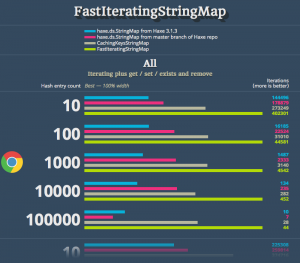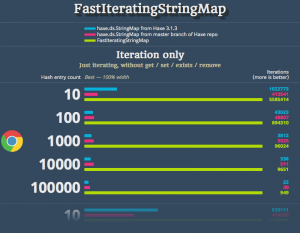Some time ago I wrote a post about an idea, how StringMap could be implemented (for js target) to have ability to iterate fast. I continued to work in this direction, and finally idea evolved into nearly final implementation.
- Tests were added;
- Special iterators implementation for case when there is no data in the map;
- Benchmark code instantiate a specific class now (instead of using creator function), to give Haxe ability to optimize map usage and inline functions;
- Haxe 3.2 (from development branch) was used to compile benchmark;
- Another idea was tested (CachingKeysStringMap);
- Constant time complexity.


